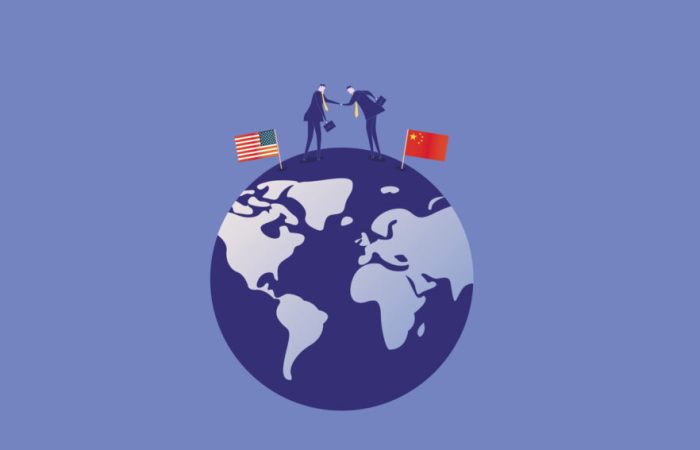On January 24, 2023, the Center for Strategic & International Studies (CSIS) China Power Project in Washington, D.C. hosted a debate on whether “China can work with the United States to provide cooperative global economic leadership to help the world economy function effectively.” Given the accelerated tension between the two economic superpowers, the panel shed their thoughts on the front path of global economic leadership structure, bilateral trading relationships, and the U.S. and China’s domestic dynamics.
Dr. Fred Bergsten, Nonresident Senior Fellow and Director Emeritus at the Peterson Institute for International Economics, argued in favor of the proposition with the following highlights. As a risen and rising economy, China has essentially reached global economic power equivalence with the United States. To form joint leadership, the U.S. and China have to cooperate in managing the global economy and maintaining their bilateral economic relationship. Although complete decoupling is neither desirable nor practical, Dr. Bergsten reminded the panel that U.S.-China cooperation is “complicated,” given the surging divide in economic, security, political, and value issues. He was careful to emphasize that the U.S. promotes “functional decoupling” instead of a complete decoupling, allowing for inevitable disagreements while cooperating on global economic issues and public good matters so as to lessen the overall mutual tension and build a stable basis for managing the global economy. Given China’s deep enmeshment in the global economy and increasing sensitivity to backlash on its misbehavior, a substantive proposal for the U.S. is to offer China a seat at the leadership table to rectify its underrepresentation in the post-Bretton Woods system. In light of all of these factors, Dr. Fred Bergsten sees a huge potential for China-U.S. cooperation on global economic leadership.
Arguing against the proposition was Mr. Daniel Rosen, Partner at Rhodium Group and Senior Associate (Non-resident) with the Trustee Chair in Chinese Business and Economic at CSIS. He was most concerned about the sharp problems in the sustainability of China’s economic development, and questioned its readiness and influence on the global system. Since Xi Jinping’s rise to the leadership in 2012, China has initiated—but shelved—a series of economic development redirection, for instance fiscal policy reformation, free domestic equity trade, exchange rate regime liberalization, and Renminbi internationalization, that are prerequisites for assuming global economic leadership. Considering the “microcosm” of the seemingly arbitrary start and end of the zero covid policy that struck the global supply chain, China has a long way to go to convince the U.S. and the rest of the world of its willingness to put global interest, growth, and leadership first. On the contrary, Mr. Rosen explains, China’s emphasis on its debt-financed domestic supply-side stimulus, while building a record-breaking trade surplus, undermines the sustainability of its growth and transfers the financial stresses onto the world economy. Given some of China’s incompatible practices with the current global economic system under the leadership principles formed by the U.S. and other developed countries, Mr. Daniel Rosen ultimately argued that China is not ready to partner with the U.S. for global economic leadership.
After the two speakers presented and exchanged their perspectives, the debate arrived at a consensus that China has the potential to become one of the world’s solid economic leaders, albeit in limited aspects. The international community is expecting China to show more commitment to the world’s economy as assuming leadership may come at the cost of their own vested interests and development.
Further to what Dr. Fred Bergsten mentioned, it can be argued that it is vital for the U.S. to facilitate the process by further clarifying the range of cooperation to their interests and avoid policy-swaying. Continuous interaction between these two parties is beneficial to both sides; it will ultimately advance mutual understanding and expectation management, which is necessary to successfully achieve joint global leadership. After China resumes normal operation after three years of lockdown, it has been actively promoting its presence in the global economy. The world will soon be able to observe whether the country can follow through on its recent commitment to “strengthening international cooperation” and “maintaining world peace,” as expressed by Vice-Premier Liu He at the January World Economic Forum. This will be especially crucial in addressing critical concerns of the United States, such as the bilateral trade dispute, intellectual property rights, international investment problems, and currency manipulation. The postponed visit by the U.S. Secretary of State Antony Blinken to China, following the unmitigated diplomatic disaster of the Chinese alleged meteorological balloon, has made it difficult to achieve constructive progress in bilateral economic cooperation in the first quarter of 2023. China may find it more efficient to recover from its public relations slump and restore high-level dialogue with the U.S. after the Two Sessions in March and the appointment of a new Ambassador to the U.S.




